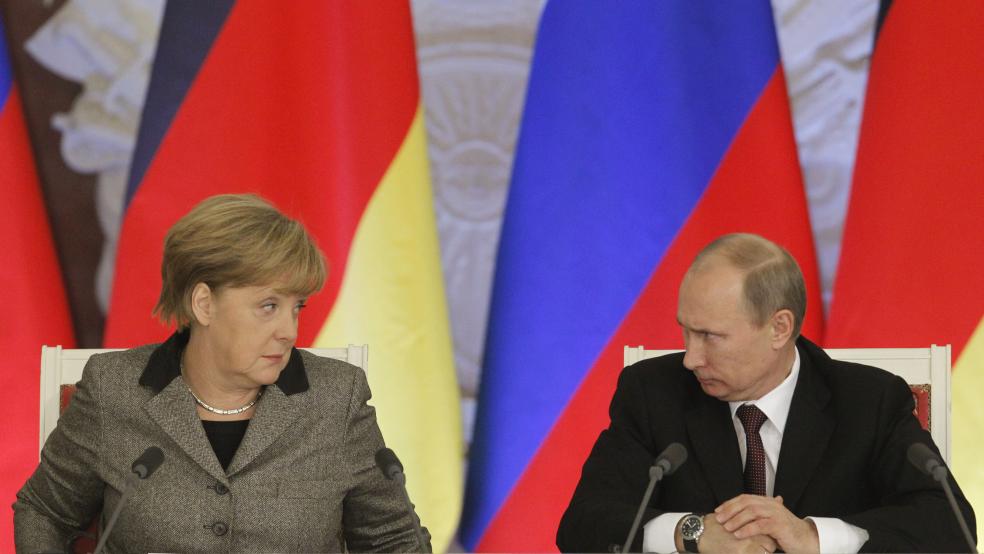Prior to the downing of Malaysian Airlines Flight 17, the United States issued harsh sanctions against Russian businesses and individuals. European leaders, however, paid lip service to new financial penalties against Russia, but ultimately failed to impose new penalties.
The reason for this is simple: Russian companies and individuals have money invested all over the continent. This creates a symbiotic relationship: Russian needs Europe just as much as Europe needs Russia.
Related: Let Europe Do the Heavy Political Lift with Putin
The most lucrative relationship between Europe and Russia is energy. Russia supplies a third of all European energy. The money that Europe pays Russia for this energy makes up 40 percent of Russian state budgets.
But the ties between Moscow and European nations go much deeper than that. In total, Europe exports $170 billion worth of good to Russia each year, and has $13 billion invested there. In turn, Russia exports $293 billion in products to Europe, and has $10 billion invested there.
The most important economic relationship Moscow has in Europe is with Berlin. The state-owned Russian energy company Gazprom is currently building a pipeline that will bypass all of Eastern Europe and deliver gas directly to German shores, ensuring that countries like Ukraine and Poland cannot disrupt supplies.
In addition, Germany exported $10.2 billion in products to Russia in the first quarter of 2014. According to Germany’s Committee on Eastern European Economic Relations, up to 25,000 jobs in Germany are at risk because of the U.S. sanctions against Russia. The same committee estimates that Germany GDP could shrink by 0.5 percent due to the financial penalties.
Related: What the U.S. Can Do Now to Punish Russia
This is why German Chancellor Angel Merkel has been so reluctant to impose harsher punishments against Russia. Even after the airline disaster, Merkel refused to put more economic pressure on Russian President Vladimir Putin.
“Regarding sanctions, I'd like to point out that the events with the plane, as far as I remember, were not even 24 hours ago and at the moment we need to sort out an independent investigation," Merkel said last week, despite a number of Germans dying in the disaster. "So it's perhaps premature to draw conclusions before we have access to the remains of the plane.”
Germany isn’t the only countries with deep ties to Russia. The United Kingdom is home to many of Russia’s oligarchs, who spend billions on British goods and real estate. They also are clients in some of Britain’s big banks. Russians purchased some 9 percent of all sales of London homes that cost more than $1.7 million from June 2012 to June 2013. Also, the enrollment of Russian children in British private schools rose 27 percent in 2013.
With UK Prime Minister David Cameron now calling for new sanctions, there is growing concern that their assets could be frozen, and Russian spending in England could dry up.
Related: Kerry Accuses Russia of Role in Malaysian Plane Attack
“In terms of sanctions, I'm very clear, having spoken to Angela Merkel and François Hollande, that the EU will be ready for further steps in terms of other areas of, particularly, some forms of advanced industrial goods which might have dual uses for defense purposes as well,” Cameron said this past weekend. “We will be looking at those things, and Russia needs to know that action will follow if there isn't a radical change in the way they behave.”
Other European countries also have economic ties with Russia. In Spain, Russians have gobbled up real estate. Italy also has deep ties with Moscow; trade with Russia accounts for some $50 billion in the Italian economy each year. Rome has been one of the biggest opponents of new sanctions against Russia.
The Italian government has been so pro-Russia that some Eastern European countries are refusing to support the candidacy of Italian Foreign Minister Federica Mogherini as the European Union's next foreign-policy chief.
Top Reads from The Fiscal Times
- Top Marine to Obama: Get in the Fight
- How Obama Lost Friends in Europe and Influence Globally
- Why the United States Spies on Germany





